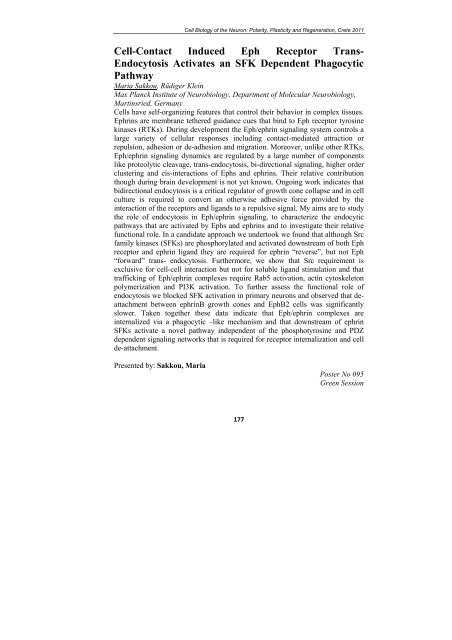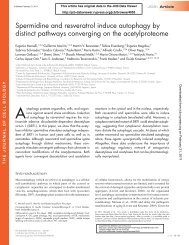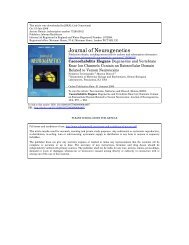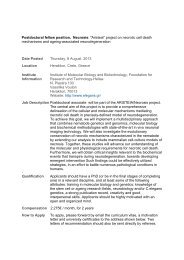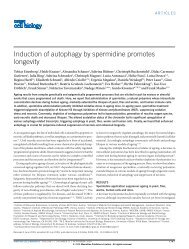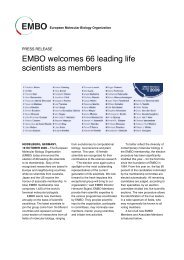CELL BIOLOGY OF THE NEURON Polarity ... - Tavernarakis Lab
CELL BIOLOGY OF THE NEURON Polarity ... - Tavernarakis Lab
CELL BIOLOGY OF THE NEURON Polarity ... - Tavernarakis Lab
Create successful ePaper yourself
Turn your PDF publications into a flip-book with our unique Google optimized e-Paper software.
Cell Biology of the Neuron: <strong>Polarity</strong>, Plasticity and Regeneration, Crete 2011<br />
Cell-Contact Induced Eph Receptor Trans-<br />
Endocytosis Activates an SFK Dependent Phagocytic<br />
Pathway<br />
Maria Sakkou, Rüdiger Klein<br />
Max Planck Institute of Neurobiology, Department of Molecular Neurobiology,<br />
Martinsried, Germany<br />
Cells have self-organizing features that control their behavior in complex tissues.<br />
Ephrins are membrane tethered guidance cues that bind to Eph receptor tyrosine<br />
kinases (RTKs). During development the Eph/ephrin signaling system controls a<br />
large variety of cellular responses including contact-mediated attraction or<br />
repulsion, adhesion or de-adhesion and migration. Moreover, unlike other RTKs,<br />
Eph/ephrin signaling dynamics are regulated by a large number of components<br />
like proteolytic cleavage, trans-endocytosis, bi-directional signaling, higher order<br />
clustering and cis-interactions of Ephs and ephrins. Their relative contribution<br />
though during brain development is not yet known. Ongoing work indicates that<br />
bidirectional endocytosis is a critical regulator of growth cone collapse and in cell<br />
culture is required to convert an otherwise adhesive force provided by the<br />
interaction of the receptors and ligands to a repulsive signal. My aims are to study<br />
the role of endocytosis in Eph/ephrin signaling, to characterize the endocytic<br />
pathways that are activated by Ephs and ephrins and to investigate their relative<br />
functional role. In a candidate approach we undertook we found that although Src<br />
family kinases (SFKs) are phosphorylated and activated downstream of both Eph<br />
receptor and ephrin ligand they are required for ephrin “reverse”, but not Eph<br />
“forward” trans- endocytosis. Furthermore, we show that Src requirement is<br />
exclusive for cell-cell interaction but not for soluble ligand stimulation and that<br />
trafficking of Eph/ephrin complexes require Rab5 activation, actin cytoskeleton<br />
polymerization and PI3K activation. To further assess the functional role of<br />
endocytosis we blocked SFK activation in primary neurons and observed that deattachment<br />
between ephrinB growth cones and EphB2 cells was significantly<br />
slower. Taken together these data indicate that Eph/ephrin complexes are<br />
internalized via a phagocytic –like mechanism and that downstream of ephrin<br />
SFKs activate a novel pathway independent of the phosphotyrosine and PDZ<br />
dependent signaling networks that is required for receptor internalization and cell<br />
de-attachment.<br />
Presented by: Sakkou, Maria<br />
177<br />
Poster No 095<br />
Green Session


